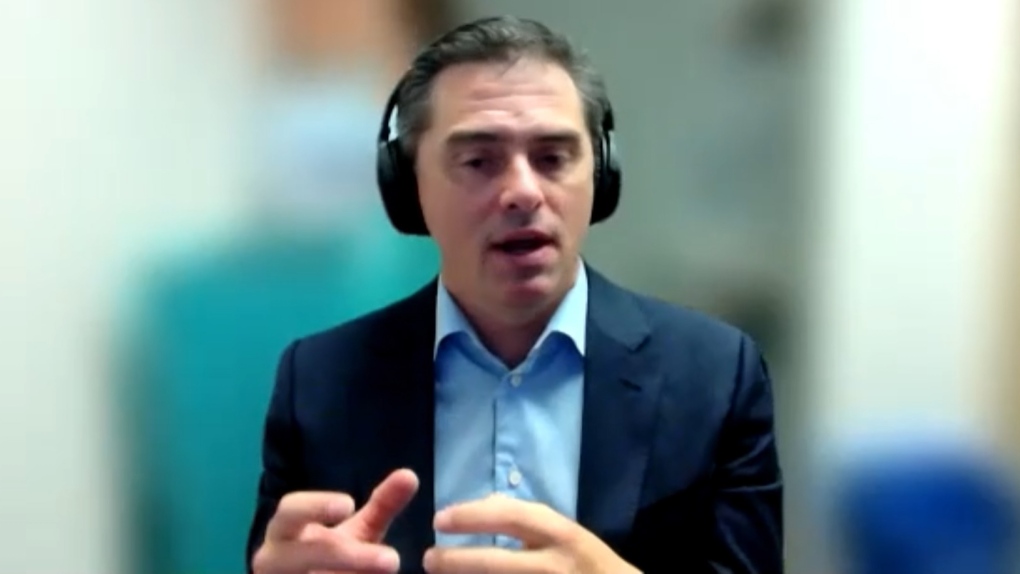Hydrogen technology key to reaching net-zero emissions targets: U of C report
Hydrogen will play a critical role in Canada's goal of achieving net-zero emissions by 2050, according to two reports from the University of Calgary released on Thursday.
The reports explore how energy produced from hydrogen can be used to help bridge today's fossil fuels-based systems and complement renewable power sources like wind and solar.
"We know now that energy efficiency is a key strategy, clean electrification is a key strategy, but they're not enough together," Chris Bataille, an industrial decarbonization specialist and one of the reports' authors, told CTV News Edmonton.
"We know we need to switch to other fuels and biofuels and a couple of other things," he said. "But hydrogen is a key strategy as well."
Bataille said hydrogen can do a lot of the same things natural gas can, but can be made using two clean methods.
"You can make it from methane and bury the CO2 underground, or you can make it from clean electricity using electrolysis."
The Simon Fraser University adjunct professor said Alberta industries like chemical production, fertilizer production and upgrading of crude oil would be the first practical applications for hydrogen technology.
 "But eventually you want to start thinking about taking it into the electricity sector," said Bataille. "Blending it with natural gas in the combustion turbines that are used to make electricity and eventually completely switching them."
"But eventually you want to start thinking about taking it into the electricity sector," said Bataille. "Blending it with natural gas in the combustion turbines that are used to make electricity and eventually completely switching them."
ALBERTA ADVANTAGES
One of the two reports that were co-authored by Bataille states that "Alberta has many advantages that make hydrogen feasible as a pathway to decarbonizing its power grid."
"First, the steam and combustion turbines that are powered by natural gas today to produce electricity in Alberta can be adapted to use hydrogen. Second, Alberta has vast amounts of natural gas that can be used to produce hydrogen, and ample geology for underground carbon capture and storage for the greenhouse gases emitted in producing hydrogen," the report reads in part.
"And third, in periods where the province’s renewable energy sources produce excess electricity, that power can be used to produce hydrogen, which can be stored for later use when renewable energy is less available."
In June, a major hydrogen production company, Air Products Inc., signed a memorandum of understanding with all three levels of government to invest $1.3 billion to build a net-zero hydrogen energy complex just east of Edmonton.
The site would produce hydrogen-fueled electricity and liquid hydrogen for international markets.
According to Air Products Inc., if all goes to plan, the "landmark" site would be operational by 2024.
PROVINCIAL PROJECTS
Last year, the Alberta government released its plan "to become a global supplier of clean, responsibly sourced natural gas," with its Natural Gas Vision Strategy.
The province's strategy includes the goal of exporting hydrogen globally by 2040.
"Absolutely critical in my mind to a clean and stable transition for Alberta and Saskatchewan is get your fugitives under control," said Bataille.
"It's the methane that's leaking at the well, that's leaking from the pipelines, that's being flared and incompletely combusted."
Bataille pointed out that methane that is not combusted is a 30 to 100 times more powerful greenhouse gas than CO2.
He said the process of reducing methane emissions is labour intensive but technically speaking easily done.
"One of the key things the Alberta government could get into right away, probably fairly uncontroversially, is to dramatically reduce those fugitives."
With files from CTV News Edmonton's Amanda Anderson
CTVNews.ca Top Stories

opinion Tom Mulcair: Prime Minister Justin Trudeau's train wreck of a final act
In his latest column for CTVNews.ca, former NDP leader and political analyst Tom Mulcair puts a spotlight on the 'spectacular failure' of Prime Minister Justin Trudeau's final act on the political stage.
B.C. mayor gets calls from across Canada about 'crazy' plan to recruit doctors
A British Columbia community's "out-of-the-box" plan to ease its family doctor shortage by hiring physicians as city employees is sparking interest from across Canada, says Colwood Mayor Doug Kobayashi.
'There’s no support': Domestic abuse survivor shares difficulties leaving her relationship
An Edmonton woman who tried to flee an abusive relationship ended up back where she started in part due to a lack of shelter space.
opinion King Charles' Christmas: Who's in and who's out this year?
Christmas 2024 is set to be a Christmas like no other for the Royal Family, says royal commentator Afua Hagan. King Charles III has initiated the most important and significant transformation of royal Christmas celebrations in decades.
Baseball Hall of Famer Rickey Henderson dead at 65, reports say
Rickey Henderson, a Baseball Hall of Famer and Major League Baseball’s all-time stolen bases leader, is dead at 65, according to multiple reports.
Arizona third-grader saves choking friend
An Arizona third-grader is being recognized by his local fire department after saving a friend from choking.
Germans mourn the 5 killed and 200 injured in the apparent attack on a Christmas market
Germans on Saturday mourned the victims of an apparent attack in which authorities say a doctor drove into a busy outdoor Christmas market, killing five people, injuring 200 others and shaking the public’s sense of security at what would otherwise be a time of joy.
Blake Lively accuses 'It Ends With Us' director Justin Baldoni of harassment and smear campaign
Blake Lively has accused her 'It Ends With Us' director and co-star Justin Baldoni of sexual harassment on the set of the movie and a subsequent effort to “destroy' her reputation in a legal complaint.
Oysters distributed in B.C., Alberta, Ontario recalled for norovirus contamination
The Canadian Food Inspection Agency has issued a recall due to possible norovirus contamination of certain oysters distributed in British Columbia, Alberta and Ontario.


































